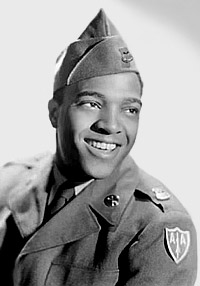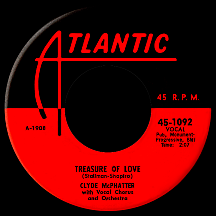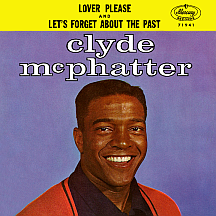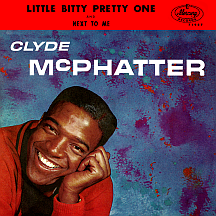CLYDE McPHATTER
New York's Apollo Theater on West 125th Street in New York, the most enduring of the many Harlem nightclubs of the last century, was the ideal place for an R&B, blues, jazz or gospel act to launch a career in the 1950s. Its Amateur Night competitions were a huge draw; the great Ella Fitzgerald took first place at the long-running Wednesday evening event in 1934, the year the club opened. Countless up-and-coming acts who got their "big break" in the still-going venue's first couple of decades include Sarah Vaughan, Roy Hamilton, King Curtis, Frankie Lymon and the Teenagers, Smokey Robinson and the Miracles, Joe Tex, Dionne Warwick (with The Gospelairs) and many, many others. When 17-year-old Clyde McPhatter appeared there in 1950, he set off a career that proceeded with two hitmaking groups followed by a solo stretch, giving him more than two dozen hit recordings over a ten-year span.
Born in Dutchville Township, North Carolina and raised in nearby Durham, he sang with the choir at Mount Calvary Baptist Church while his mother played organ. After World War II, Clyde, barely a teenager, and the family moved to Teaneck, New Jersey, just east of New York City. His youthful voice changed from the soprano range to a high tenor and he performed as the lead singer of The Mount Lebanon Singers before entering the Apollo's amateur contest with a rendition of bluesman Lonnie Johnson's 1948 hit single "Tomorrow Night." The Dominoes, led by Georgia native Billy Ward, had hired Charlie White (a tenor with the New Lebanon Singers) and added McPhatter based on the one performance and a subequent audition.
He was billed as Clyde Ward when the group entered the Apollo's talent contest, but reverted to his given name after a short time. Soon they appeared on the top-rated CBS-TV series Arthur Godfrey's Talent Scouts (singing Leadbelly's "Goodnight Irene," which had recently topped the charts for Gordon Jenkins and the Weavers), and it was enough for arranger Rene Hall to recommend them to Syd Nathan, president of King Records in Cincinnati, who placed the Dominoes on his newly-formed Federal Records subsidiary with "Do Something For Me" (penned by Bily Ward with longtime business associate Rose Ann Marks), a ballad featuring Clyde's lead vocal, his first studio recording. It reached Billboard's R&B top ten in February 1951.
"Sixty Minute Man," with a lead by deep bass Bill Brown and backing vocal by McPhatter, established the Dominoes as a powerhouse in 1951, as well as an act that put one over: its suggestive 'teasin'...pleasin'...blowin' my top' refrain spent over three months at number one R&B while unpredictably crossing over to the top 20 of the pop charts. After this, Clyde took lead duties on "I Am With You" and "That's What You're Doing to Me," following in 1952 with a forceful lead performance on "Have Mercy Baby," which held the the top R&B spot for most of that summer. Every hit song during that time was a Billy Ward-Rose Marks composition including "I'd Be Satisfied" (the first credited on labels to Billy Ward and his Dominoes) and a funeral-set performance that elicited a frenzied reaction from live crowds when witnessing Clyde's sobbing, screaming, mournful delivery of the song, another hit in early '53.
But Clyde was dissatisfied with Ward's treatment of his singers: he paid each of them a weekly wage (100 dollars by some accounts) minus taxes and even the cost of hotel bills. It didn't take a financial expert to figure out that a group with seven big hits (a couple of them million sellers) was getting the short end...McPhatter, the main attraction, was worth a lot more! A confrontation with Ward ended with McPhatter's resignation. Ahmet Ertegun, president of Atlantic Records, was present at one of the group's shows shortly afterwards and noticed he was missing, getting confirmation from Billy that he had fired him (which was not the way Clyde told the story). While the ballad "These Foolish Things Remind Me of You" became the final Ward/Dominoes single featuring Clyde, he was making arrangements with Atlantic to front his own group.
McPhatter brought in singers to audition (including members of the Mount Lebanon Singers), but none of them impressed Ertegun or recently-hired producer Jerry Wexler, so they sought out candidates from various places, though many didn't stay long; one exception was Bill Pinckney, an exceptional bass and baritone vocalist, who was with the act for a few years. "Money Honey," the first single for Clyde McPhatter and the Drifters, dominated R&B charts throughout the fall of 1953, a third chart-topper added to the two he'd had with the Dominoes. The second release was a two-sided hit: "Such a Night" and "Lucille" (which Clyde had written and recorded as a demo, with his earlier choices for group members, at the first Atlantic session).
In the spring of '54, he was drafted by the U.S. Army and stationed in Buffalo. It turned into a convenient situation, as he could make the short hop to New York on furlough and continue recording with the group. Atlantic reversed the billing on the next release (the Drifters featuring Clyde McPhatter); "Honey Love," a playfully suggestive tune composed by Clyde and Wexler (using his proper first name, Gerald), was another R&B number one that summer, keeping McPhatter's three-year string of successes going almost uninterruped. "Bip Bam" was next, followed late in the year by their take on Irving Berlin's "White Christmas" (McPhatter and Pinckney both receiving label credit) and a song by Ertegun (as Nugetre, his name spelled backwards), "What'cha Gonna Do."
Clyde had decided much earlier that he was going to pursue a solo career, but it didn't happen right away. One thing that irked him (to put it mildly) was George Treadwell's position as the group's manager since its formation; the former jazz musician seemed like a good bet due to his handling of wife Sarah Vaughan's impressive career, yet his tactics were so restrictive it made Ward's treatment, in comparison, seem much less unfair (ultimately Treadwell kept the lion's share of profits for himself, as he also did with Vaughan until their divorce a few years later). Clyde parted ways with Treadwell at a good time (though the split gave the manager complete control over the Drifters' name and all successive group members until his death in 1967).
While continuing his Army service, McPhatter made his first solo record for Atlantic, "Everyone's Laughing," in the summer of '55, followed by "Love Has Joined Us Together," a duet with one of the label's top stars, Ruth Brown. Another song from these sessions, "Seven Days," written by Willis Carroll and Cuban-born Carmen Taylor (a team that had contributed songs to other Atlantic artists including The Clovers and The Cookies), was first recorded by Clyde (making the R&B top ten) and crossed over to the pop charts where it competed with popular covers by Dorothy Collins and The Crew-Cuts. His next release would go further as a pop crossover while the main fan base remained intact.

"Treasure of Love" boosted the solo phase of his career, reaching the top of the R&B charts while making a top 20 showing on the pop best sellers in June 1956. He was discharged from military service by this time and made a slight change in musical preference, abandoning the playfully flirty songs in favor of more serious romanticism with hits like "Without Love (There is Nothing)," "Just to Hold My Hand" and a cover of "Long Lonely Nights," giving serious competition to Lee Andrews and the Hearts' original. All had top ten R&B chart placement while performing well on the pop side. In the fall of 1958 he scored with what would be his biggest solo record, "A Lover's Question," composed by Brook Benton (who hadn't yet launched his own string of hits) and Jimmy Williams. While it extended his run of number one R&B singles, its top ten ranking on Billboard's fledgling Hot 100 made him more determined to gain a better position in the popular field.
With the expiration of his Atlantic contract looming, he accepted an offer from Arnold Maxin of MGM Records. Working with Ray Ellis, who'd done a lot of freelance arranging for Atlantic, he picked right up where he left off. His first MGM disc, Otis Blackwell and Jimmy Williams' "I Told Myself a Lie," was as solid as anything he'd done during the last year, yet it performed poorly alongside Atlantic's release of his version of a Clovers tune, "Lovey Dovey." The next MGM single, "Twice as Nice," lost out to "Since You've Been Gone" on Atlantic. Each new MGM single had to compete against unreleased songs from his previous label. In early 1960, "Let's Try Again" got to the top 50 on the Hot 100 and top 20 on R&B, the best he would ever do with MGM; the label dropped him after one year.
In March of 1960, McPhatter toured England with Bobby Darin and Duane Eddy; Darin hosted a U.K. television special, This is Bobby Darin, broadcast on ITV in April. Clyde sang "Think Me a Kiss" (his fourth MGM single) and was accompanied by Darin on piano as he sang his great Dominoes hit "Have Mercy Baby." The experience gave him a fresh outlook on his place in the industry and the appreciation fans in other countries had for his work. Back in the U.S., while Atlantic continued putting out singles of earlier material, Clyde Otis, who'd spent the last year doing A&R for Mercury Records, helming Brook Benton's explosive breakout in '59 while also reviving Dinah Washington's career, signed Clyde to the label and began applying Belford Hendricks' signature string-enhanced arrangements to his recordings. With "Ta Ta," a ditty he'd penned with former Drifters guitarist Jimmy Oliver, McPhatter made his return to the pop top 30 and R&B top ten. Soon after, Otis left Mercury for Liberty Records, where he bestowed his magic touch upon newcomer Timi Yuro.
Shelby Singleton, who was working for Mercury out of Nashville at the time, had been involved with some of the singer's recording dates in New York. He convinced Clyde to go with him to Nashville to cut some sides at Owen Bradley's studio with a crack team of musicians that included saxophonist Boots Randolph, bass player Bob Moore, harmonica man Charlie McCoy and other well-seasoned players. Good intentions aside, nothing clicked from those sessions, so Clyde headed back to New York in early '62...and had his hottest hit in nearly four years. "Lover Please" had been written by Billy Swan (of later "I Can Help" fame) and was first recorded by Dennis Turner for the small Louis label of St. Louis (where else?). McPhatter's nearly-note-for-note cover benefited from an all-around more energetic production, including piano by Hargus "Pig" Robbins (one of Shelby's favorite Nashville session players) and a sax break by N.Y.'s super session man King Curtis. Singleton had a strong feeling about "Lover Please," instructing Mercury reps to lean hard on radio stations, though it didn't turn out to be too difficult: it was a top ten smash!
Then Clyde went back to Nashville for "Little Bitty Pretty One," which had a driving arrangement similar to its predecessor, though it was a gamble seeing as how it had already made the charts by composer Bobby Day as well as Thurston Harris (a top ten hit) and Frankie Lymon. Clyde's take, while offering nothing new to the earlier recordings, did well, reaching the top 30 in July 1962. In comparison, his rendition of the Jimmy Radcliffe-Carl Spencer song "Deep in the Heart of Harlem"found him in an entirely different mindset than anything previously done; a moody piece, it addressed the poor working man's dilemma, a slightly-ahead-of-its time civil rights commentary that reached the Cash Box R&B top ten in February 1964 and became the lead track for an ambitious album with a predominant theme: Songs of the Big City.
In 1965 he left Mercury and recorded for Amy Records, working in Muscle Shoals, Alabama with FAME studio founder and producer Rick Hall. Of five singles, only "Little Bit of Sunshine" showed any promise at radio, but it quickly disappeared. After another European tour in 1967, he lived for two years in Great Britain (1968 to 1970) where he'd been so enthusiastically welcomed. Just two singles were released on the Deram label, produced by Wayne Bickerton (previously a member of The Pete Best Four, led by the former Beatles drummer). McPhatter's alcohol consumption escalated during that time. Upon returning to the U.S., he reunited with Clyde Otis and Belford Hendricks in Philadelphia and recorded some sides for Decca...to no avail.
His influence on numerous singers is worthy of mention. From Jackie Wilson (his replacement in the Dominoes) to Bobby Hendricks (his replacement in the Drifters) to high tenor hitmakers like Dee Clark, Marv Johnson, Jimmy Jones and Smokey Robinson, his imprint can be easily found in the annals of rock, rhythm and soul. Yet by the early 1970s, despite having remarkable success during the previous two decades, an accomplishment that would satisfy most artists given the odds, he seemed to lose any fighting spirit. Close friends said he considered himself a failure. Over time, he'd come to depend more and more on the bottle to ease his depression. Clyde McPhatter passed away on June 13, 1972 as the result of a heart attack. He was 39 years old. Millions of fans who knew him as an outstanding singer and performer were deeply saddened.
NOTABLE SINGLES:
- Do Something For Me - 1951
by the Dominoes - Sixty Minute Man - 1951
by the Dominoes - I Am With You - 1951
by the Dominoes - That's What You're Doing to Me - 1952
by the Dominoes - Have Mercy Baby - 1952
by the Dominoes - I'd Be Satisfied - 1952
by Billy Ward and his Dominoes - The Bells - 1952
by Billy Ward and the Dominoes / - Pedal Pushin' Papa - 1952
by Billy Ward and the Dominoes - These Foolish Things Remind Me of You - 1953
by Billy Ward and his Dominoes - Money Honey - 1953
as Clyde McPhatter and the Drifters - Such a Night - 1954
as Clyde McPhatter and the Drifters / - Lucille - 1954
as Clyde McPhatter and the Drifters - Honey Love - 1954
as the Drifters featuring Clyde McPhatter - Bip Bam - 1954
as the Drifters featuring Clyde McPhatter - White Christmas - 1954
as the Drifters featuring Clyde McPhatter and Bill Pinckney - What'cha Gonna Do - 1955
as Clyde McPhatter and the Drifters - Everyone's Laughing - 1955
- Love Has Joined Us Together - 1955
by Ruth Brown and Clyde McPhatter - Seven Days - 1956
- Treasure of Love - 1956
- Without Love (There is Nothing) - 1956
- Just to Hold My Hand - 1957
- Long Lonely Nights - 1957
- Rock and Cry - 1957
- Come What May - 1958
- A Lover's Question - 1958
- Lovey Dovey - 1959
- I Told Myself a Lie - 1959
- Since You've Been Gone - 1959
- Twice as Nice - 1959
- You Went Back on Your Word - 1959
- Let's Try Again - 1960
- Just Give Me a Ring - 1960
- Think Me a Kiss - 1960
- Deep Sea Ball - 1960
- Ta Ta - 1960
- Before I Fall in Love Again (I'll Count To Ten) - 1960
- Tomorrow is a-Comin' /
I'll Love You Til the Cows Come Home - 1961 - I Never Knew - 1961
- Lover Please - 1962
- Little Bitty Pretty One - 1962
- The Best Man Cried - 1962
- Deep in the Heart of Harlem - 1963
- Crying Won't Help You Now - 1965
- Little Bit of Sunshine - 1966
- I'm Not Going to Work Today - 1966
- Only a Fool - 1968
- Why Can't We Get Together - 1970




